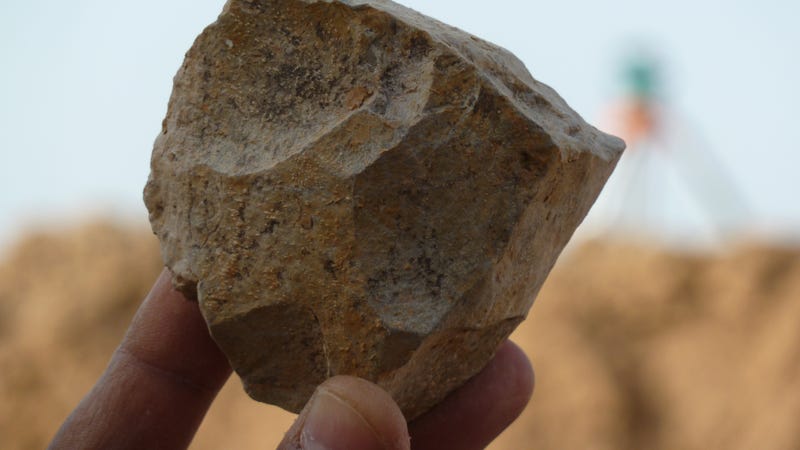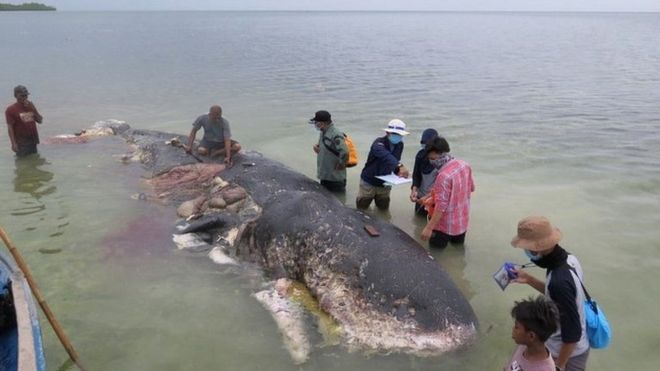“The Human Origin Story Has Changed Again, Thanks to New Discovery in Algeria”

https://gizmodo.com/the-human-origin-story-has-changed-again-thanks-to-new-1830747304
The discovery of 2.4-million-year-old stone tools and butchered bones at a site in Algeria suggests our distant hominin relatives spread into the northern regions of Africa far earlier than archaeologists assumed. The find adds credence to the newly emerging suggestion that ancient hominins lived—and evolved—outside a supposed Garden of Eden in East Africa.
“EU Unveils Plan to Cut Emissions to Zero, in Bid to Save Planet”

The European Union unveiled its long-term vision on combating climate change in a push for more ambitious action on the environment just days after U.S. President Donald Trump rejected his government’s warning on the economic costs of global warming.
The 28-nation bloc, responsible for 10 percent of global greenhouse-gas emissions, set a 2050 perspective to help give direction to member states, companies and citizens to anticipate costs in fighting temperature increases. The EU’s updated strategy comes a week before representatives from almost 200 countries are due to meet in Poland for an annual conference on addressing climate change.
Hundreds of apparently ‘flash-frozen’ turtles wash ashore in New England

Recent cold snap see’s a higher number than usual of critically endangered turtles stranded during their migration south.
Click here
“Dead sperm whale found in Indonesia had ingested ‘6kg of plastic'”

https://www.bbc.com/news/world-asia-46275742
A dead sperm whale that washed ashore in a national park in Indonesia had nearly 6kg (13 lbs) of plastic waste in its stomach, park officials say.
“Americans Will Pay Billions More For Climate Change, and That’s the Best Case”

A grim U.S. government assessment of global warming’s economic impacts gives a whole new meaning to Black Friday.
“During the Triassic, This Elephant-Sized Relative of Mammals Lived Alongside the Dinosaurs”

https://gizmodo.com/during-the-triassic-this-elephant-sized-relative-of-ma-1830572760
What’s remarkable about the new discovery, says Brusatte, is that this very old cousin of mammals had evolved similar features—a huge size and column-like limbs held under the body—as true mammals would, albeit many tens of millions of years later.
““Little ogres”: A scientific discovery has unearthed a new kingdom of life”

https://qz.com/1467662/a-scientific-discovery-has-unearthed-a-whole-new-kind-of-creature/
Scientists say we’re all eukaryotes: Plants, animals, fungi, and tiny multicelled organisms called protists are the four kingdoms of life, which encompass everything living that we’ve found on Earth.
But a new discovery from Dalhousie University in Nova Scotia, published in Nature, claims to have discovered a fifth kingdom of life—a new kind of eukaryote. The paper describes two organisms, one newly unearthed in Nova Scotia and one discovered in 1988, which upon DNA analysis are more distinct from anything else than previously thought.
“Human Evolution Is Still Happening – Possibly Faster Than Ever”

http://econintersect.com/pages/opinion/opinion.php?post=201811160055
Modern medicine’s ability to keep us alive makes it tempting to think human evolution may have stopped. Better healthcare disrupts a key driving force of evolution by keeping some people alive longer, making them more likely to pass on their genes. But if we look at the rate of our DNA’s evolution, we can see that human evolution hasn’t stopped – it may even be happening faster than before.
“Deepwater Horizon oil spill’s dramatic effect on stingrays’ sensory abilities “
This is the first study to measure the physiological effects of exposure to crude oil on marine life’s olfactory systems. The results concluded that when exposed to crude oil, stingrays’ had significantly reduced olfactory functions.
Click here to read…


Recent Comments